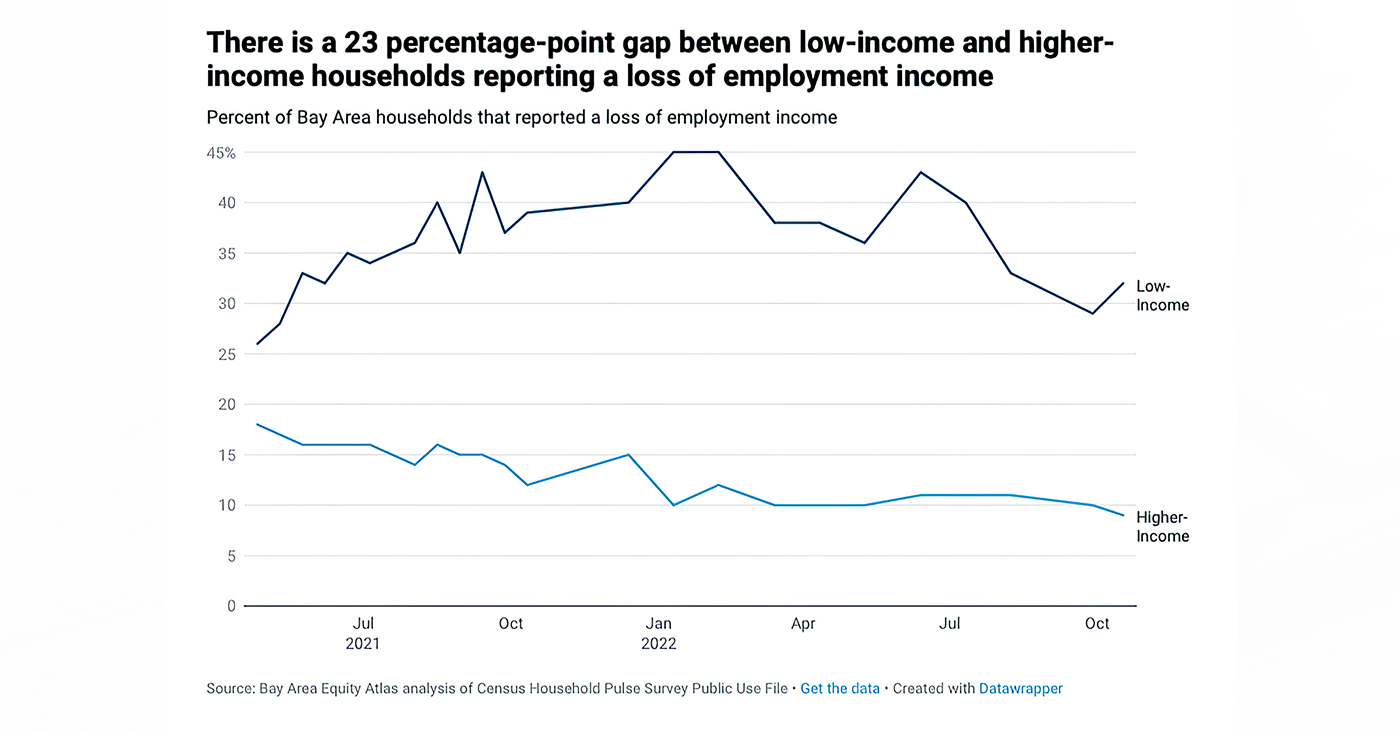By Kiley Russell
Bay City News
As the Bay Area’s economy continues its up-and-down recovery from the worst effects of the COVID-19 pandemic, recent data shows that many low-income households and communities of color are getting left behind.
In a January report based on data analyzed via the “Bay Area Recovery Tracker” online tool, the Bay Area Equity Atlas found that despite some promising economic gains, the hope that a rising tide would lift all boats appears to be floundering.
“We’re finding this consistently, that low-income adults and people of color are continuously struggling to cover their usual expenses,” said the report’s author Simone Robbennolt.
The report found that six in 10 low-income adults in the Bay Area — people living in households earning less than $50,000 a year — and almost half of adults of color still report having a somewhat or very difficult time paying for usual expenses, compared to 21 percent of white people and 22 percent of people with higher incomes.
“That’s anything from buying groceries to paying house and utility bills or just keeping up with monthly card payments, and so we’re seeing consistently that this number is not really shifting and we’re kind of seeing almost a stagnation for some of these indicators where we would want to see progress almost three years out, four years out,” said Robbennolt, an associate with PolicyLink, which produces the Bay Area Equity Atlas along with the San Francisco Foundation and University of Southern California’s Equity Research Institute.
This comes amid an environment where many economic indicators continue to show some promise, despite worries over inflation, rising interest rates and tech-sector layoffs.
For example, data from the U.S. Department of Commerce shows that gross domestic product is estimated to have increased by 3.2 percent nationally in the third quarter of 2022 compared to the previous quarter and by 2.7 percent in the fourth quarter.
Also, gross domestic product — the value of goods and services produced in specific areas — increased by nearly 4 percent in California during the third quarter, with personal income growth hitting 5.2 percent in the state.
But by October 2022, 26 percent of people of color in the Bay Area reported a loss of income due to job loss or a reduction in hours or wages, while just 8 percent of white people reported a similar loss of income, according to data incorporated into the Equity Atlas dashboard from the U.S. Census Household Pulse Survey.
“We’re also seeing a gap widening between lower-income and higher-income households experiencing loss of employment income,” Robbennolt said. “When the pandemic first hit, there was about an 8 percentage point gap between these two groups and since then it’s increased threefold and we’re seeing a 23 percentage point gap.”
This appears to show that while higher-income white people are steadily recovering from the worst of the COVID downturn, lower-income people of color are heading in the opposite direction, despite some efforts to ensure an equitable economic recovery with policies like direct COVID relief payments and expanded unemployment benefits.
The report points out that there have long been “stark differences in income inequality” in the Bay Area, where income grew by 69 percent for very-high-wage earners and by 53 percent for high-wage workers from 1980 to 2019.
During the same period, income grew by 17 percent for middle-income workers and actually dropped by 2 percent for low-wage earners and 9 percent for very-low-wage earners.
“The pandemic, in a lot of ways, laid bare a lot of the existing inequities and made a lot of them worse,” said Louise Auerhahn, director of economic and workforce policy at Working Partnerships USA, a Silicon Valley organization that works to foster a more equitable regional economy, among other things.
It was “forcibly brought home” during the pandemic that the majority of jobs deemed essential — things like retail, food service and long-term care — are not well compensated or “valued in proportion to the value they bring to the economy,” Auerhahn said.
“The overwhelming majority of those in-person essential jobs are done by workers of color, immigrants and women in the Bay Area,” she said.
This phenomenon of “occupational segregation,” wherein workers of color are overrepresented in low-wage and low-quality jobs, is a consistent factor in the region’s racial pay gaps, according to the report.
For example, in San Mateo County, Latino workers account for 25 percent of the total working-age population but make up 74 percent of building and grounds cleaning and maintenance workers, while white workers are 38 percent of the working population and hold 54 percent of management jobs.
To help lower-wage workers keep afloat during the pandemic, many federal, state and local governments implemented a variety of emergency policies, including food assistance, expanded unemployment benefits, direct payments and utility shutoff and eviction moratoriums.
“There’s a lot of data that those worked, that they really reduced poverty and people entering homelessness,” Auerhahn said. “But all of those are ended or are ending. It’s quite likely to get a lot worse in the next year if we don’t take some actions to mitigate the end of these supports that have helped people hang on.”
The report suggests several policies that could help foster a more equitable economic recovery, including implementation of a living wage, ensuring workers have health care, paid leave, retirement accounts and stable working environments, as well as ensuring people have the right to unionize.
“I think a lot of things are still in flux and there’s still an opportunity to make (the recovery) more equitable,” Auerhahn said. “You have to understand that our economy, as it is now, as it was before the pandemic, is very deeply and structurally inequitable, so if we proceed with business as usual it’s going to increase inequality.”
A link to the full report can be found at https://bayareaequityatlas.org/recovery-tracker/economic-security.
Copyright © 2023 Bay City News, Inc. All rights reserved. Republication, rebroadcast or redistribution without the express written consent of Bay City News, Inc. is prohibited. Bay City News is a 24/7 news service covering the greater Bay Area.



 Activism4 weeks ago
Activism4 weeks ago
 Activism4 weeks ago
Activism4 weeks ago
 Alameda County4 weeks ago
Alameda County4 weeks ago
 Activism4 weeks ago
Activism4 weeks ago
 Alameda County4 weeks ago
Alameda County4 weeks ago
 Activism4 weeks ago
Activism4 weeks ago
 Activism4 weeks ago
Activism4 weeks ago
 Activism3 weeks ago
Activism3 weeks ago


















































